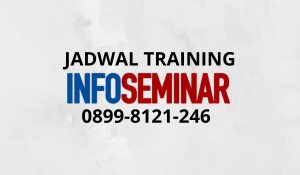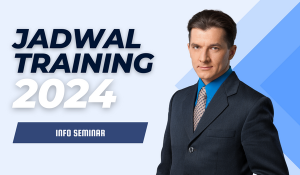Risk Management (JAKARTA)
Jakarta, 3 November 2015 – 5 November 2015
Including : Souvenir, Flash disk, materi hand-out dan CD modul, 2x coffee break, makan siang dan sertifikat
Description
The phrase Risk Management used to refer to insurance purchasing on behalf of a corporation. Over the past two decades, the term has come to be associated with financial engineering and derivatives on stock market.
After several spectacular failures by firms and individuals using derivatives, academics and practitioners have renewed their focus on risk management as a corporate decision making process.
The course describes and considers the essential, underlying theory and concepts in risk management that should inform the design and operation of efficient and effective risk management processes.
This then leads to an understanding of how risks change for different organizations and how they respond. Through the use of analysis of corporate governance styles and the over-riding culture of a firm, this will lead a thorough understanding of the complex strategy making process and the relationships between corporate governance, management practice, moral/ethical considerations and risk management outcomes.
The training participants will study the formal risk management requirements as expressed by various rule-based and principles-based corporate governance frameworks and contrast these with alternative ways of construing strategy formation in organizations.
In particular, the training shall describe further to consider the potential interaction between formal planned and controlled processes with responsive initiatives where strategy emerges, while a strong emphasis on critical overview of the implementation of risk management responses, within an organizational setting.
In particular the module of this course will provide a thorough introduction to a range of risk management tools, techniques, systems and processes for managing organizational risk. Participants will be enhanced with practical case studies as related risk management strategy and governance.
Objectives
The goal of this course is to study the management of risks in a corporation with its all operational impacts. Participants shall benefits from this risk management comprehensive course as with the followings:
- Learn a risk management as a process that can be applied to a variety of risks entails to any types of organization, in parallel gaining a through understanding upon the inherent impacts
- Develop an understanding of what risk is, how it can be measured and transferred, why individuals care about risk, and why corporations care about risk. Further result participants shall have shrewdness in identifying analyzing inherent risks within the organization business processes, while consequently having the capability to define and implement risk management strategy and solutions
- Apply the risk management process to two major areas of concern for corporations: liability risk and financial risk, in some detail, and capable of designing the structure of risk governance in the organization
- By the completion of the course the participants should have a good conceptual framework for analyzing risk and making decisions in a corporate setting, and in relation to good corporate governance by considering; risk management strategy, internal control strategy, and corporate governance principles
- Participants shall have the capability in designing and implementing risk management programs within their organizations within the direction to develop “Risk Management Culture”
Target Audience
Top Management – in order to get a sufficient understanding and make an informed decision on the implementation of corporate risk governance
All Levels of Management – in order to understand the implications of risk management on the company, and in order to easily meet the Good Corporate Governance (GCG) requirements for the organization
Risk Management and Risk Governance Representative (and others involved in the implementation of risk management and risk governance strategies) – in order to gain an overview of the good risk governance requirements and how to integrate into organization’s business strategy
Duration : 3 Days
Course Contents and Descriptions
Day:1
Directions for risk management development.
Possibilities in six dimensions – what, when, why, whichway, who, and wherewithal.
Definitions.
Definitions of risk, threat, opportunity and uncertainty distinguished; relationship with performance objectives, implications for uncertainty management. Risk management, opportunity management and uncertainty management compared.
Objectives for risk management applications.
Distinguishing benefits and objectives for risk management. Objectives for process, application, performance and strategic capability; links between these objectives. Planning the scope and purpose of a risk management application.
Building capability in risk management.
Assessing risk management capability (benchmarking, risk maturity). Descriptors of capability: focus of attention,range of application contexts, nature and quality of risk management processes. Facilitators of risk management capability: scope of supporting risk management nfrastructure, supporting organisational capabilities, organisation learning, organization culture, human resource capability.
Risk governance.
How risk management functions are positioned within organizations; reporting lines; CRO function; Terms of Reference for risk/audit and other teams. Understanding how all aspects of risk are managed in organisations – risk committees, risk roundtables. How corporate governance requirements motivate directors towards risk management. Role of shareholders in influencing risk management. Importance of risk reporting, internally up through and across organisations and externally to stakeholders.
Day 2:
Corporate governance.
Study different approaches to risk analysis and risk management:
• A multinational finance perspective.
• An international business perspective.
• An integrative risk management perspective.
• A strategic exposure perspective.
Risk management frameworks.
Strategic flexibility and real options perspectives in strategic decision making.
Strategic management and risk management – a closer look.
Strategic response capabilities and responsive organizations
Structured approaches to managing risk.
To explain the business benefits associated with adopting a proactive and structured approach to managing organization risks. To explore how an organization implementing an enterprise-wide approachto managing risk needs to adopt a range of techniques to address specific risks. To identify the consequences of not managing risks successfully through case studies of the impact of significant organisational threats and the failure to seize significant business opportunities.
Risk management strategies.
To identify a range of potential strategies for managing risk including resilience, flexibility, robustness and controls. To critically evaluate the benefits and limitations of each alternative strategy. To understand where regulatory pressures (such as Basel II, Solvency II, Sarbanes Oxley etc) impose constraints on an organization in terms of the approaches available.
Internal controls.
To explain the fundamental purpose of internal controls
and how a sound system is established. Determine how controls provide reasonable assurance regarding the effectiveness of organizational operations, procedures and compliance with external regulatory requirements.
Hierarchy of risk responses.
To outline a range of potential risk responses and explain why these fit into a natural hierarchy. To explore how there may not be a single possible response to a specific risk and how risk responses need to be tailored to each risk issue.
Eliminate and control risk.
To explain how strategies associated with eliminating risk at source are implemented by reference to concepts such as ‘Inherent Safety’ and learning from other organizations, mistakes. To explain how strategies associated with modifying the probably of occurrence of outcomes are developed by reference to a range of approaches including:
- Risk control as applied to property loss control, fire safety and physical security.
- Health, safety and environmental management.
- Financial fraud risk management.
- IT security risk management.
- Portfolio management of opportunities (private equity portfolios, pharmaceutical
product pipelines).To explain how strategies associated with modifying the consequences of an eventshould it occur are developed by reference to a range of approaches including:
- Crisis management and communication.
- Business Continuity Management.
Risk financing.
To explain how strategies associated with transferring the consequences of events are developed by reference to a range of approaches including:
- Contractual risk transfer.
- Outsourcing of services.
- Insurance.
- Securitisation and catastrophe bonds.
- Derivatives and treasury risk management solutions.
- Blended solutions such as risk retention and Alternative Risk Financing (ARF).To briefly review the mechanisms of application as well as the strengths and limitations of each.
Managing uncertainty and capturing opportunities.To explain how strategies associated with developing resilient and flexible organizations are developed by reference to a range of approaches including information system networks. To explain how strategies associated with seeking out risk are developed in particularly with reference to deriving business benefit and opportunities from operating with high levels of risk. Consider issues such as:
• Managing organizational change.
• Corporate social responsibility.
• Evaluating merger and acquisition opportunities
Day 3:
Risk management decisions.
To explain how to evaluate a range of potential risk responses techniques. To understand how an organization managing a range of enterprise risks needs to adopt techniques capable of facilitating management decision making when resources available to manage risks are finite.
Risk management programs.
To explain how the range of risk responses reviewed to date can be brought together within an overall risk management program. To identify the different elements of a risk management system (Policy, Objectives, Roles and Responsibilities, Risk Assessment, Risk Controls, Monitoring, Auditing and Reporting) and how these are implemented in practice. To explore how an organization can implement risk management program. To identify ways of sustaining the development of a risk management program over time including techniques such as Continuity Improvement.
Risk management culture.
To explore the cultural aspects of implementing a risk management programme including how to select approaches that are appropriate to a particular organization’s culture. To understand how to translate a risk management Policy and Strategy into a series of medium term (3-5 year) risk management Objectives and hence implement a risk management Improvement Program. To understand what can happen if a risk management program is not adapted to an organization’s culture. To explore how to manage and monitor a risk management improvement program across a large or complex organization. To understand the need to develop and embed risk management skills and understanding in the organization to support the implementation of a risk management program. To introduce the concept of a ‘learning organization’. To explore the value of monitoring and auditing program progress as a way of evaluating the effectiveness of risk responses and encouraging continuous improvement
Case Studies Exercises
During the course, several case studies/exercises are introduced. Participants will have an opportunity to apply their expertise, in the context of the course material on risk management and risk governance
Trainer : Dr. Ir. Fauzi Hasan, MM, MBA
Dr. Fauzi Hasan Pada saat ini adalah President American Academy untuk Chapter Indonesia yang melingkupi American Academy of Project Management dan American Academy of Finance Management yang berpusasat di Colorado Spring, Colorado USA.
Pengalaman Dr. Fauzi Hasan diperkaya dengan keterlibatannya pada beberapa proyek terkait Business Process Modeling dan Improvement yang selaras dengan standard dan metodologi CMMI (Capability Maturity Model and Integration), dimana dalam akhir dekade ini banyak membantu organisasi Pemerintah dan Bank dalam membangun dan mengimplementasi Crisis Management Strategy seperti pembuatan BCP (Business Continuity Plan) dan DRP (Disaster Recovery Plan).
Dr. Fauzi Hasan telah memberikan kontribusi langsung untuk penyelesaian dan keberhasilan penerapan Frameworks dan Best Practices seperti: ITIL, COBIT, PMBOK, Prince2, TOGAF, ISO 20000, ISO 27000, ISO 38500, COSO dan yang lain diberbagai bidang industri. Sebagai seorang profesioal yang kompeten di bidang teknologi informasi, manajemen proyek dan proses bisnis ini dibuktikan dengan dimilikinya sejumlah sertifikat Internasional terkait tata kelola teknologi informasi dan industri (IT and Industrial Goverannce).
Dr. Fauzi Hasan dalam karirnya sebagai executive telah bekerja di beberapa perusahaan lokal maupun internasional seperti: Philips Netherlands, Sony , Warner Lambert, Singapore Technology Logistics, Hewlett-Packard, EMTEK Group, Intergraph, Jatis eCom-Sumitomo Group, dan ERESHA Group.
Investasi : Rp 5.000.000,- termasuk ( Souvenir, Flash disk, materi hand-out dan CD modul, 2x coffee break, makan siang dan sertifikat )
Tempat : Hotel Harris Tebet, Jl. Dr. Sahardjo No. 191 – Jakarta Selatan








